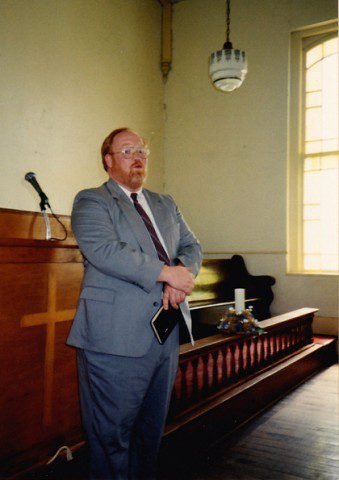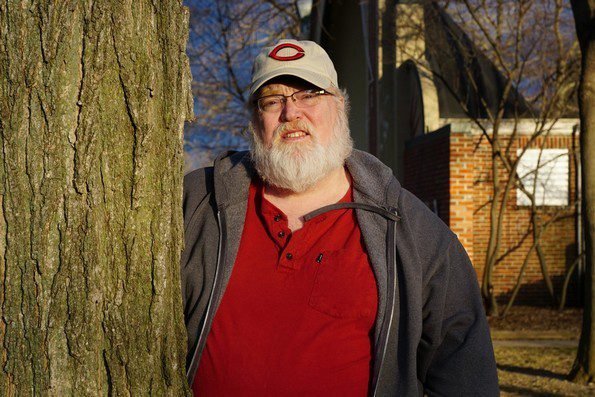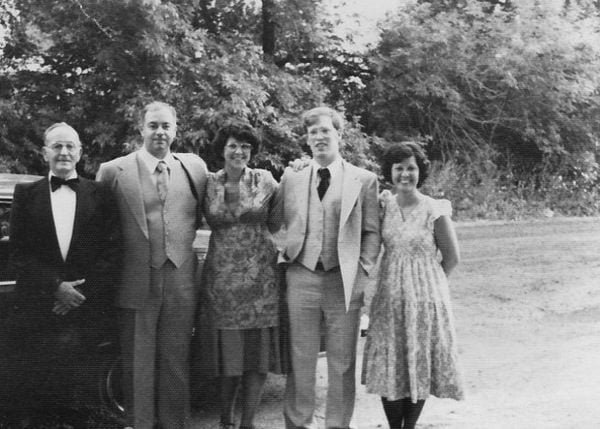
As many readers know, my wife, Polly, and I have six children. Our oldest child will turn forty in May, and our youngest will be twenty-six. We have two distinct families: the oldest three, a space of five years, and then the youngest three. The first group grew up in a strict Fundamentalist Baptist pastor’s home. Economically, during their childhoods, we lived from hand to mouth, and sometimes the hand didn’t quite reach. The latter grew up in a less-strict, more inclusive Evangelical pastor’s home. Economically, things greatly improved — especially from the late 1990s forward. What remained the same for both groups was the fact that their lives revolved around the church and my work as a pastor. It is in this context that my six children know me.
I left the ministry in 2005, and deconverted from Christianity in 2008. For the first time, my children, then ages fifteen through twenty-nine, experienced family life that did not revolve around the church. For the first time, Dad wasn’t the law by which they had to live. In 2009, I sent a letter to family, friends, and parishioners, that said, in part:
I have come to a place in life where I can no longer put off writing this letter. I have dreaded this day because I know what is likely to follow after certain people receive it. I have decided I can’t control how others will react to this letter, so it is far more important to clear the air and make sure everyone knows the facts about Bruce Gerencser.
I won’t bore you with a long, drawn out history of my life. I am sure each of you has an opinion about how I have lived my life and the decisions I have made. I also have an opinion about how I have lived my life and decisions I made. I am my own worst critic.
Religion, in particular Baptist Evangelical and Fundamentalist religion, has been the essence of my life, from my youth up. My being is so intertwined with religion that the two are quite inseparable. My life has been shaped and molded by religion and religion touches virtually every fiber of my being.
I spent most of my adult life pastoring churches, preaching, and being involved in religious work to some degree or another. I pastored thousands of people over the years, preached thousands of sermons, and participated in, and led, thousands of worship services.
To say that the church was my life would be an understatement. As I have come to see, the Church was actually my mistress, and my adulterous affair with her was at the expense of my wife, children, and my own self-worth.
Today, I am publicly announcing that the affair is over. My wife and children have known this for a long time, but now everyone will know.
The church robbed me of so much of my life and I have no intention of allowing her to have one more moment of my time. Life is too short. I am dying. We all are. I don’t want to waste what is left of my life chasing after things I now see to be vain and empty.
….
I know some of you are sure to ask, what does your wife think of all of this? Quite surprisingly, she is in agreement with me on many of these things. Not all of them, but close enough that I can still see her standing here. Polly is no theologian, she is not trained in theology as I am. She loves to read fiction. I was able to get her to read Bart Ehrman’s book Misquoting Jesus and she found the book to be quite an eye-opener.
Polly is free to be whomever and whatever she wishes. If she wants to start attending the local Fundamentalist Baptist church she is free to do so, and even has my blessing. For now, she doesn’t. She may never believe as I believe, but in my new way of thinking, that is OK. I really don’t care what others think. Are you happy? Are you at peace? Are you living a good, productive life? Do you enjoy life? Yes, to these questions is good enough for me.
I have six children, three of whom are out on their own. For many years I was the spiritual patriarch of the family. Everyone looked to me for the answers. I feel somewhat burdened over my children. I feel as if I have left them out on their own with no protection. But, I know they have good minds and can think and reason for themselves. Whatever they decide about God, religion, politics, or American League baseball is fine with me.
All I ask of my wife and children is that they allow me the freedom to be myself, that they allow me to journey on in peace and love. Of course, I still love a rousing discussion about religion, the Bible, politics, etc. I want my family to know that they can talk to me about these things, and anything else for that matter, any time they wish.
The best thing I ever did for Polly and our children is to say to them, you are free. Choose your own path. At the time, I received quite a bit of criticism for doing this. “How dare I cut them loose and ask them to choose their own path when I had, for the most part, dictated their path for them!” While I understood where my critics were coming from, I saw no way to handle things other than setting everyone free. It was time for everyone to fly on his or her own, much like the fledgling kicked out of the nest,
Each of my children has plotted his or her own course. None of them stayed in the Evangelical church, and neither are they all atheists. Some of them are religious/spiritual, and others are indifferent towards religion. Now, this doesn’t mean I agree with all of the choices they have made. What’s different is that they no longer have to conform to Evangelical beliefs/practices/morality/ethics. They don’t have to bow to Bruce Almighty’s authority and interpretation of the Bible. They are, in every way, FREE. Of course, the same goes for their parents. In the Gerencser family, freedom is a two-way street. We may disagree on specifics, but we put our family relationships first. Too bad we didn’t choose this way of life sooner, but crying over the past is a waste of time. What we have is the present and each and every day ahead until we meet our end.

Polly and I are blessed to have twelve grandchildren — ten girls and two boys — ages nine months to eighteen years. Our grandchildren only know us post-Jesus, post-church, post-ministry. They have never seen us pray or read the Bible, attended church with us, nor heard me preach. They know Nana as a woman who makes them awesome food and works at Sauder’s Woodworking. Grandpa they know as the man who takes lots of photographs and comes to their games. They know nothing about our previous lives as Pastor and Mrs. Bruce Gerencser. They know nothing about our travels and the churches I pastored. We bought our home in 2007. This is the only house our grandchildren will ever know us to live in. And that’s okay. We hope to live long enough for our grandchildren to grow up, become adults, and have families of their own. We hope that they will have wonderful memories of spending time with Nana and Grandpa. We hope after we are gone that they will drive by our home and have fond memories of playing in our big jungle of a back yard. Maybe they will wistfully say to their own children, “I remember when Nana and Grandpa planted this tree, that bush, or flowers.” Regardless, unlike our children, they will NOT have any memories of Grandpa preaching and Nana playing the piano. That part of our life is foreign to them. All of them, in time, will stumble upon this blog. They will read stories that deeply resonate with their grandparents and parents, but have no connection to them.
A couple of days ago, one of my sons required a letter from me stating that he had been baptized. He and his wife are becoming more active in church, and he wants to become a member. While I was typing up the letter, my son explained to his oldest daughter that I used to be a pastor and that I had baptized him at nearby Harrison Lake. She quizzically looked at me and said, “Grandpa, you were a pastor?” I replied, “Yes. I was for twenty-five years. Someday, when you are older, we will talk about it!” My granddaughter pondered for a moment what I said, and then moved on to other things. Someday, she will know the story of the life and times of Bruce Gerencser. For now, I am content to leave things as they are.
About Bruce Gerencser
Bruce Gerencser, 61, lives in rural Northwest Ohio with his wife of 40 years. He and his wife have six grown children and twelve grandchildren. Bruce pastored Evangelical churches for twenty-five years in Ohio, Texas, and Michigan. Bruce left the ministry in 2005, and in 2008 he left Christianity. Bruce is now a humanist and an atheist. For more information about Bruce, please read the About page.
Bruce is a local photography business owner, operating Defiance County Photo out of his home. If you live in Northwest Ohio and would like to hire Bruce, please email him.
Thank you for reading this post. Please share your thoughts in the comment section. If you are a first-time commenter, please read the commenting policy before wowing readers with your words. All first-time comments are moderated. If you would like to contact Bruce directly, please use the contact form to do so.
Donations are always appreciated. Donations on a monthly basis can be made through Patreon. One-time donations can be made through PayPal.









